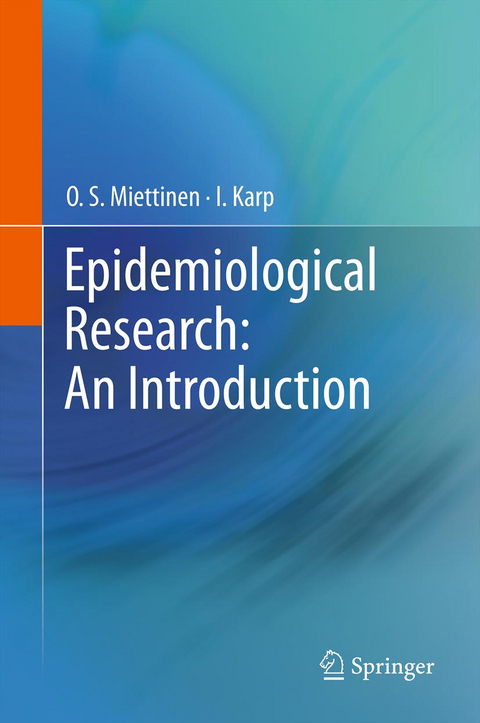
Epidemiological Research: An Introduction
Seiten
2012
Springer (Verlag)
978-94-007-4536-0 (ISBN)
Springer (Verlag)
978-94-007-4536-0 (ISBN)
Presenting the insights of one of the leading participants in recent advances in the field, this innovative, ambitious book introduces epidemiological research, exploring important concepts and connecting the discipline to related fields such as statistics.
Having last year published “Up from Clinical Epidemiology & EBM” and also “Epidemiological Research: Terms and Concepts,” Miettinen now – this time with collaboration from his junior colleague I. Karp – brings out this further introduction into epidemiological research; and he is now working on an introduction into clinical research, for publication next year. It evidently is Miettinen’s felt time to crystallize the basic understandings he has come to as the culmination of a half-century of concentrated effort to advance the theory of epidemiological and ‘meta-epidemiological clinical’ research.
In accord with its title, this book focuses on research to develop the knowledge-base for preventive medicine, which mainly is knowledge about the causal origin –etilogy, etiogenesis – of illness. It first illustrates how wanting this knowledge still is, despite much research; and it then aims to guide the reader to more productive etiogenetic research.
This book places much emphasis on the need to assure relevance by principles-guided objects design for the studies, which now remains conspicuously absent from epidemiologists’ concerns. And as for methods design, this book exposes the fallacies in the still-common ‘cohort’ and ‘case-control’ studies, defines the essentials of all etiogenetic studies, and then addresses the true options for design in this framework of shared essentials.
A good deal of attention is also given to the still commonly-held, very major, twin fallacies that screening for an illness is a preventive intervention, to be studied by randomized trials, and that research on it can imply rational guidelines orrecommendations regarding decisions about the screening.
While Miettinen already is regarded as ‘the father of modern epidemiology,’ he now appears to have become the father also of post-modern epidemiology, where ‘epidemiology’ still means epidemiological research.
Having last year published “Up from Clinical Epidemiology & EBM” and also “Epidemiological Research: Terms and Concepts,” Miettinen now – this time with collaboration from his junior colleague I. Karp – brings out this further introduction into epidemiological research; and he is now working on an introduction into clinical research, for publication next year. It evidently is Miettinen’s felt time to crystallize the basic understandings he has come to as the culmination of a half-century of concentrated effort to advance the theory of epidemiological and ‘meta-epidemiological clinical’ research.
In accord with its title, this book focuses on research to develop the knowledge-base for preventive medicine, which mainly is knowledge about the causal origin –etilogy, etiogenesis – of illness. It first illustrates how wanting this knowledge still is, despite much research; and it then aims to guide the reader to more productive etiogenetic research.
This book places much emphasis on the need to assure relevance by principles-guided objects design for the studies, which now remains conspicuously absent from epidemiologists’ concerns. And as for methods design, this book exposes the fallacies in the still-common ‘cohort’ and ‘case-control’ studies, defines the essentials of all etiogenetic studies, and then addresses the true options for design in this framework of shared essentials.
A good deal of attention is also given to the still commonly-held, very major, twin fallacies that screening for an illness is a preventive intervention, to be studied by randomized trials, and that research on it can imply rational guidelines orrecommendations regarding decisions about the screening.
While Miettinen already is regarded as ‘the father of modern epidemiology,’ he now appears to have become the father also of post-modern epidemiology, where ‘epidemiology’ still means epidemiological research.
Foreword. Preface. Acknowledgements.-1. Epidemiology: grappling with the concept.-2. Epidemiological knowledge: examples.-3. Etiology as a pragmatic concern. -4. Etiology as the object of study.- 5. Etiologic studies’ essentials.-6. Etiologic studies’ typology.-7. Etiologic studies’ objects design.-8. Etiologic studies’ methods design.-9. Etiologic studies’ intervention counterparts .-10. Causal studies’ acausal counterparts.-11. Studies on screening for a cancer.-12. Some paradigmatic studies.-13. From studies to knowledge.-14. Fact-finding in epidemiological practice. Index.
| Erscheint lt. Verlag | 25.7.2012 |
|---|---|
| Zusatzinfo | XIV, 186 p. |
| Verlagsort | Dordrecht |
| Sprache | englisch |
| Maße | 155 x 235 mm |
| Themenwelt | Medizin / Pharmazie ► Allgemeines / Lexika |
| Studium ► Querschnittsbereiche ► Epidemiologie / Med. Biometrie | |
| Studium ► Querschnittsbereiche ► Prävention / Gesundheitsförderung | |
| Schlagworte | epidemiology • Introduction • Research |
| ISBN-10 | 94-007-4536-2 / 9400745362 |
| ISBN-13 | 978-94-007-4536-0 / 9789400745360 |
| Zustand | Neuware |
| Informationen gemäß Produktsicherheitsverordnung (GPSR) | |
| Haben Sie eine Frage zum Produkt? |
Mehr entdecken
aus dem Bereich
aus dem Bereich
ein überfälliges Gespräch zu einer Pandemie, die nicht die letzte …
Buch | Hardcover (2024)
Ullstein Buchverlage
24,99 €


